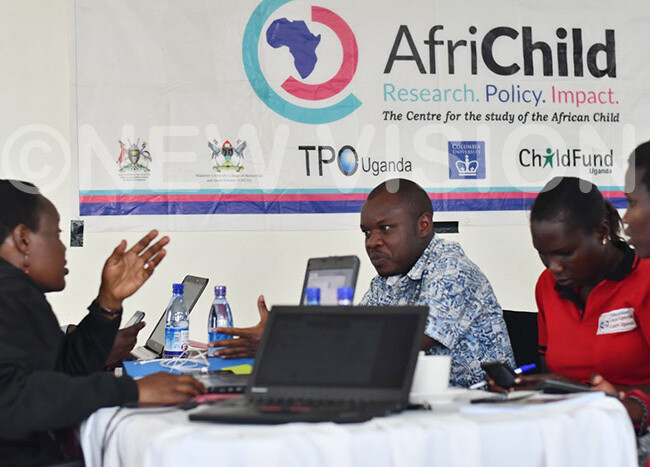Policy makers and practitioners equipped with research skills
The training was attended by participants from government ministries including ministry of health, education, and ministry of labour, gender and social development as well as those from civil society organisations
RESEARCH
The AfriChild Centre in Makerere University has trained 30 policy makers and practitioners on how to use evidence-based research to inform policies and programmes that aim to improve children's welfare.
The training, akin to a crash-course, extensively covered more than 10 research and programme areas namely: understanding the research process; searching, organising and storing research literature; communicating research findings to policy makers and implementers; tenets of child-focused research; policy development; systematic reviews and meta-analysis; the research to policy gap and problem identification.
Speaking during the four-days training which took place at Fairway Hotel in Kampala from Monday to Thursday, Prof. Rosalind Grace Lubanga, a seasoned social-work academic said, there is need to have transparent processes to uptake research evidence in various government and civil society organization departments.
"The practice landscape comprises many actors and there is a lot of politicization of issues which does not bear results for our children. We need individuals with skills to use the research evidence and that is why this training is timely," she said.
The training was attended by participants from government ministries including ministry of health, education, and ministry of labour, gender and social development as well as those from civil society organisations such as Dwelling Places, Parenting Uganda, ANPPCAN, UWEZO.
Participants from religious bodies such as the Inter-Religious Council of Uganda (IRCU) and Uganda Muslim Supreme Council (UMSC) were also in attendance.
Regarding acquisition and use of research evidence, head of department-Early Childhood Development at Kyambogo University, Dr Godfrey Ejuu told trainees to always check the quality of research evidence because it ought to fill gaps in programming and policy making.
Dr Ejuu also told trainees to acquaint themselves with knowledge of the political system and manifesto in order to ease policy absorption and implementation.
 Some of the participants discussing
Some of the participants discussing
"One always has to check the relevance of the research findings-how close is the evidence to what you engage in daily as policy makers or practitioners. Not every evidence is relevant for you," he said.
The training was comprised of a skills lab, a practical session where trainees worked as teams to develop policy and programme briefs; brainstorm on ways to uptake and use research evidence to improve child wellbeing and how to conduct research with children.
Sheikh Juma Cucu from the UMSC noted that the training equipped him with skills to ask policy-relevant research questions and know the link between researchers, policy makers and practitioners in the research process.
This training was part of AfriChild's project, ‘Building the next generation of researchers which aims to build capacity of academics, policy makers and practitioners to conduct rigorous child-focused research.